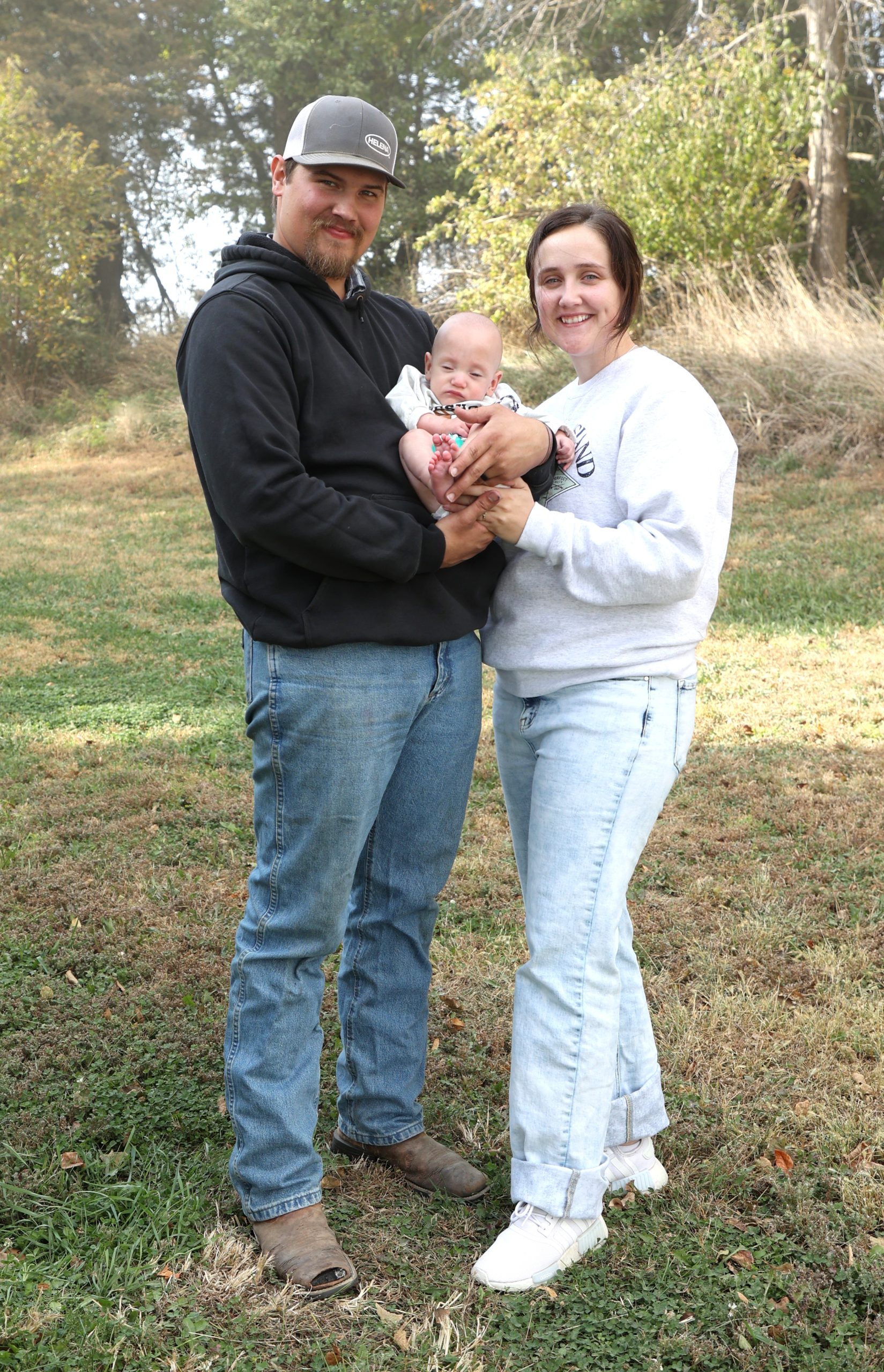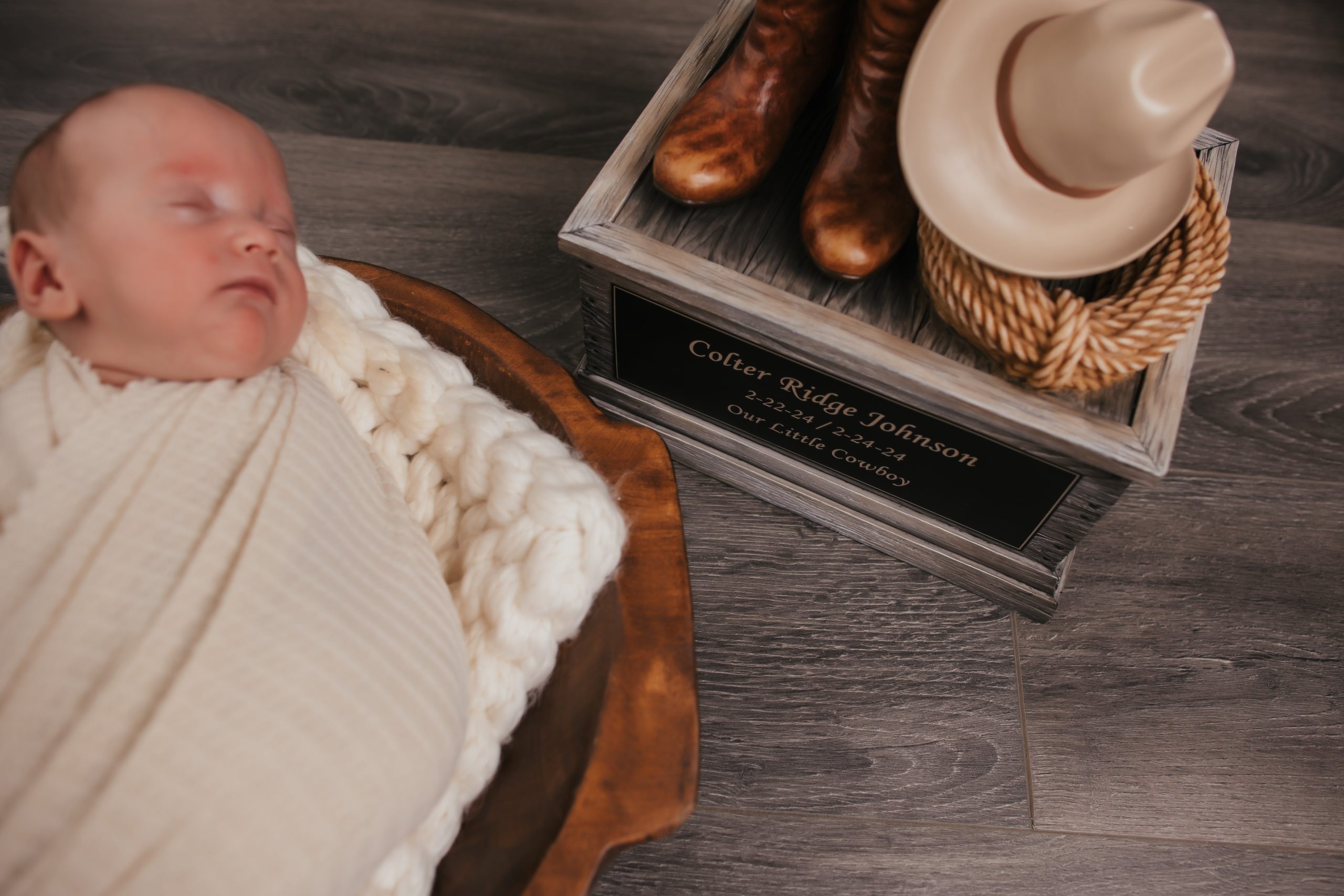‘He could still be with us:’ Togetherness in Trauma
Content warning: story mentions death/dying
A Ronald McDonald House can be a place of conflicting emotions. It’s been said that this is the best place you never want to be. Amid traumatic experiences, families can feel overwhelming joy mixed with fear mixed with sadness and anger and exhaustion and inspiration. One of the challenges of this journey is figuring out how to allow all those disparate emotions to exist simultaneously, to live a life while holding concern for another.
Taylor and Couy Johnson, a young couple from Wakefield, a small town in northeast Nebraska, were faced with this challenge in the most extreme of circumstances. Expecting twins, Taylor says when she got home was when she truly felt like a parent for the first time. Then, she walked into the nursery to find a single crib.
“I think it really didn’t set in until we got home,” she says. “All the emotions hit me at once.”
The pregnancy had progressed normally for the first five months, but after Taylor experienced severe back pain, Couy took her to the nearest hospital. The doctors there saw signs of an emergency, so they put Taylor in an ambulance to nearby Sioux City, Iowa. It became clear the babies were on the way, though at just 22 weeks gestation, they would need an even more specialized level of care, so Taylor was then flown to Omaha by helicopter. Couy hopped in a car with his parents for what felt like an interminable road trip south on I-29.
Couy says he doesn’t remember much from that drive, but he remembers the silence of the car, filled with fear, a feeling Taylor shared during her flight. The risk to her health was far from insignificant, and if the babies were born this prematurely before they arrived at a hospital, the medical team’s ability to provide the care they needed was severely diminished while in the air. Taylor worried, “what if Couy wouldn’t get to meet them?”
Thankfully, the helicopter arrived at Omaha’s CHI Bergan Mercy Hospital in time, as did Couy and his parents, only minutes before the first twin was born. They named him Thayne, measuring 10 inches long and weighing 14 ounces. Couy could hold him in the palm of his hand. Prior to the delivery, doctors had put his odds of survival at 30 percent. 
Taylor recalls the intense emotions, of love for her first child, of fear for his safety, of misery at the thought of losing them. She says she almost had to adopt a mentality of, “Well, I don’t want to get attached.” In Thayne’s fragile state, any touch on his skin or insertion of a needle would cause trauma. They were informed that, in the event Thayne’s heart stopped beating, CPR would not be an option without causing more damage.
She says, “It’s so hard to keep going when you know that they have to go through all this.”
Because things looked so dire for Thayne, doctors wanted to postpone the second delivery for as long as possible, to allow him more time for growth and development. They hoped a few extra days could give him a better chance of beating his own slim odds. After three more days, the second twin was born, and named Colter.
Despite the extra time in the womb, Colter’s condition was even more critical than Thayne’s. He suffered from severe bruising, which led to bleeding in his brain and lungs. While doctors did what they could for as long as they could, it became clear that it wasn’t going to be enough. Colter Johnson passed away at two days old.
Unthinkable circumstances for any parent, and as devastating as it was, Taylor is quick to graciously thank the medical team at the hospital for their help in making it all even a bit more tolerable: “I don’t think we could have done it without the Bergan Mercy NICU staff.”
The nurses especially were comforting and helpful not only with Colter, but with Thayne, who, still in the NICU, had a long journey ahead of him. Meanwhile, Taylor was discharged from the hospital, and she and Couy settled into a room at Ronald McDonald House Charities in Omaha.
Initially, Taylor wasn’t exactly excited to be away from the hospital, though the warmth of the House proved to be a necessary change for her. “In the NICU, there’s just a lot of beeping, and you’re staring at the same floor and walls all day long. Thayne’s room had no windows because he was so little, so then you’re in the dark, and it gets to be a lot.
“It was so nice to be able to come here instead of being in the hospital 24/7.”
Something as simple as a quiet room and a hot shower had an enormous impact on their ability to cope with everything. The challenges didn’t disappear, but coming to the House allowed Taylor to “shut it all off, take a breath, and relax.”
The past week had been a complete blur. Taylor says, “We went to church that morning and everything was fine, and then the next thing we knew, we were in Omaha with twins.” Everything around them was moving so fast. They were being tossed around by the unforgiving, seemingly unceasing winds of this reality, and they felt incapable of grabbing onto something, anything, to steady themselves.
 Eventually, they found such a handle, in a humble dresser.
Eventually, they found such a handle, in a humble dresser.
She put clothes in the drawers and straightened up their belongings. Taylor continues, “At the hospital, everything was just kind of chaotic. So being able to have a nice clean area to put everything and organize it, it helped me.”
In the hospital, there was very little Taylor and Couy could do other than react. They held no control over how things were going, but when they started staying in the House, they had a room that was theirs, with a space just for them, organized how they wanted it to be organized. There was a recliner where Taylor could pump, or Couy could rest. “You have your own little place to just relax,” Couy says.
A hot cup of coffee was only one button away. Treadmills allowed Taylor a chance to exercise and clear her head. Laundry facilities were available at all hours of the day, crucial for a couple who had no time to pack before being transported 100 miles south. And no matter what time they returned from the hospital, there was either a hot meal on the kitchen counter or leftovers in the refrigerator waiting for them.
Couy sums it up: “It felt like home.”
Much like home, the Johnsons’ loved ones could mail letters and packages to the family during their stay. Taylor says, “I loved getting mail.” She used to work at a preschool where she met a child named Penelope, whose hearing was impaired and used American Sign Language (ASL) to communicate. Taylor was inspired by both Penelope and her sister, Brenley, to learn ASL and has plans to work in deaf education in the future. Those two young children would often send her letters and pages from a coloring book, lifting spirits and offering words of encouragement.
Taylor and Couy also received encouragement from others in the House, including staff, volunteers, and another family who had a preemie in the NICU. They could invite friends and family to the House without being stuck in a cramped hospital room. Having that kind of support was absolutely critical, particularly in the days following Colter’s passing. “Our anxiety was already so high with the NICU and everything. So, coming here was just,” Taylor pauses to think of the right phrase. “Kind of like, we could breathe.”

While they caught their collective breath, they were faced with an excruciating situation.
“We have to plan a funeral for our baby.”
As Taylor says, “We’re 21 years old, we know nothing about funerals.” They only knew they didn’t want to bury Colter: “We didn’t want him to be all alone.”
The hospital staff prepared plaster molds of Colter’s hands and feet and presented them to the family. Taylor wanted to ensure that those molds were safe, so she set them on a shelf in their Ronald McDonald House room, next to Colter’s urn, a rustic, wooden container with ceramic cowboy boots, hat, and a lasso on top. Our Little Cowboy is displayed below his name and the dates of his birth and death.
“That way he could still be with us.”
In the NICU, Thayne was far from out of the woods. He had a breathing tube providing oxygen and for the first couple of weeks, Taylor and Couy were on a bit of a roller coaster ride, with scary moments followed by a “honeymoon phase” of progress. They were told not to let their guard down for at least a month.
But, little by little, Thayne improved. His lungs developed enough to require less oxygen forced into his system. He became more active, especially at night. He gained weight. “Being born at 14 ounces, every pound is a huge milestone,” Taylor says.
After three-and-a-half months, the doctors began talking about going home, which is when Couy first started to think, “He’s going to be okay.” Thayne continued checking off the developmental boxes, until one day, four months after being born, two days before his projected due date, he got the all-clear. The family could go home.
Doctors told Taylor how rare it was for a baby born as prematurely as Thayne to go home before his due date, without oxygen, and exclusively breastfeeding. “They said you never see that,” she says, then adds, “It’s because his twin brother’s watching over him.”
Before getting in the car for the drive home, Couy and Taylor brought Thayne to a place his mother says played a significant role in their journey: “[Without the Ronald McDonald House] I don’t think we would have been able to cope the way we did.”
As the Johnsons left, their boys in tow, RMHC program staff couldn’t help but be overwhelmed with emotions. Tears of sadness and tears of joy, flowing together, as twin boys who entered the world three days apart went home on the same day.

To support a family like the Johnsons this holiday season, consider making a donation today.
